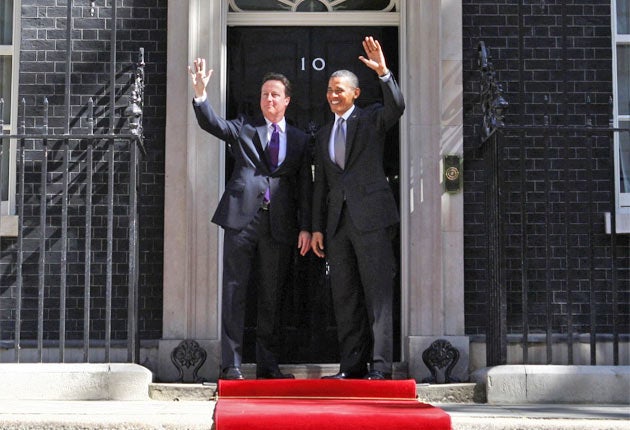Obama fails to endorse Coalition's spending cuts

Barack Obama stopped short of endorsing the Coalition Government's big spending cuts yesterday in a setback to David Cameron's hopes of winning the President's seal of approval.
Although Mr Obama said the US and UK shared the same goals of securing economic growth and deficit reduction, he insisted that each country would tackle the problems in their different ways and at their own pace. He also suggested that nations would need the flexibility to change course if their strategy was not working – a so-called "Plan B", which the Chancellor George Osborne refuses to contemplate. Speaking at a joint press conference next to Mr Cameron, the President said the success in pulling the world out of recession was in large part due to concerted action between the US, UK and other countries – a process in which Gordon Brown played a leading role.
Admitting that the US and UK were cutting on a different timescale, Mr Obama said: "The nature of the debt and deficits are different. And as a consequence, the sequencing and pace may end up being different."
He added: "This is going to be a constant process of trying some things, making adjustments... We've got to make sure that we take a balanced approach and that there's a mix of cuts, but also thinking about how do we generate revenue."
He also spoke of the need to maintain investment in education, science, technology and infrastructure.
The President insisted that he and Mr Cameron wanted to arrive at the "same point" – sustainable growth without leaving a mountain of debt to future generations.
Before his state visit, Tory officials had hoped that the Obama administration's plans to cut the US deficit from next year would mean that his comments on the British economy could be seen as endorsing the UK's fast, deep spending cuts. The White House was irritated by reports that such an endorsement might be given.
Mr Cameron played down the differences between the two countries, insisting the US was adopting a "relatively similar programme" to get on top of the deficit. "We may take slightly different paths but we want to end up in the same place," he said.
Speaking in the garden of Lancaster House, after Downing Street talks dominated by two very different military conflicts, Mr Cameron praised Mr Obama's "bold and visionary" speech last week on the deadlocked Middle East peace process and sought to avoid a split over whether the Palestinians should seek a recognition of statehood by the United Nations. Britain and France are sympathetic, but Mr Cameron said the EU should discuss the issue first.
Mr Obama made clear his rejection of the idea. "What the UN is not going to be able to do is to deliver a Palestinian state. The only way that we're going to see a Palestinian state is if Israelis and Palestinians agree on a just peace." In an historic address to MPs and peers in Parliament's Westminster Hall, the President insisted that there was no conflict between America's values and self-interest over the Arab Spring. "The United States and United Kingdom stand squarely on the side of those who long to be free. And now, we must show that we will back up those words with deeds," Mr Obama said.
Join our commenting forum
Join thought-provoking conversations, follow other Independent readers and see their replies
Comments
Bookmark popover
Removed from bookmarks